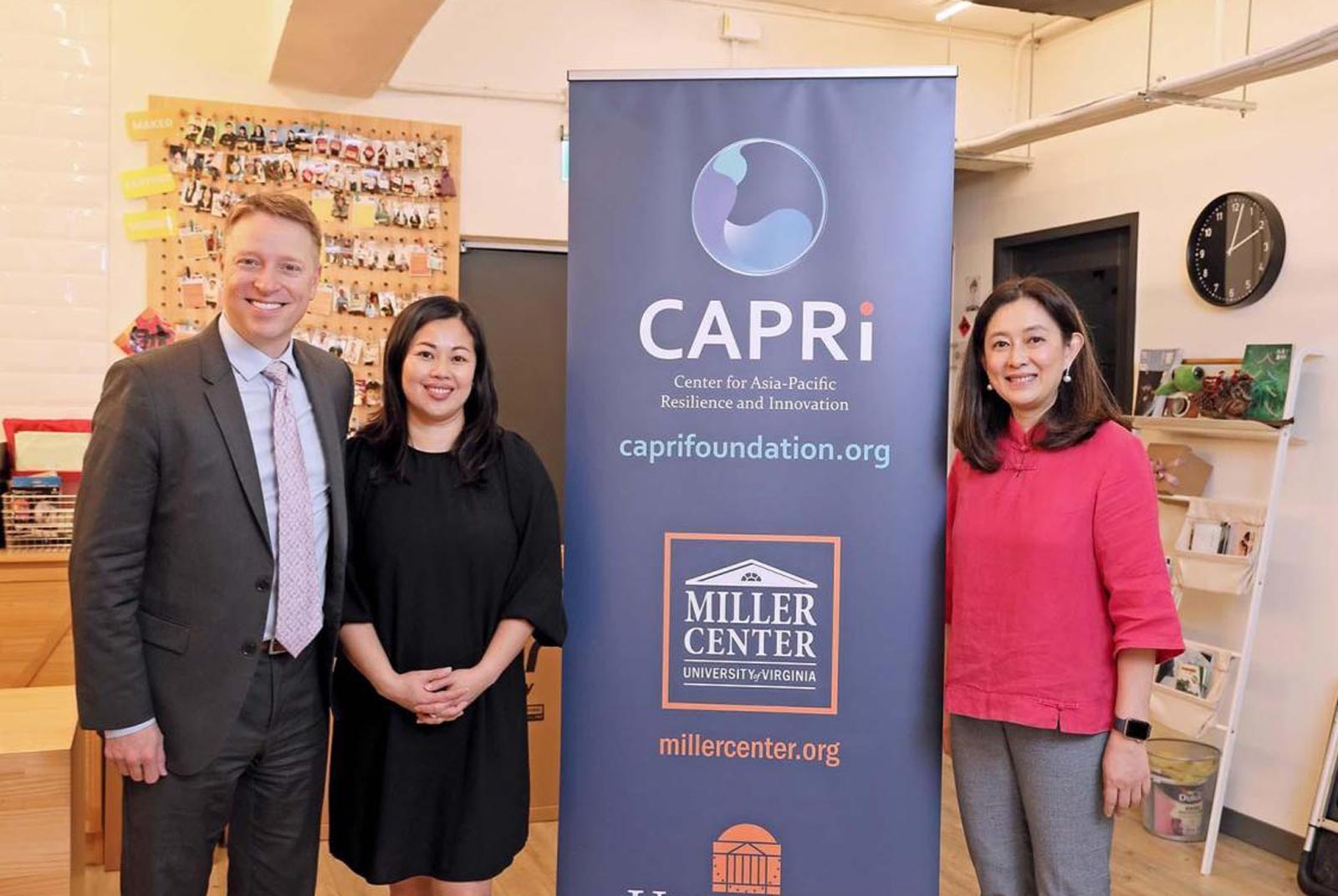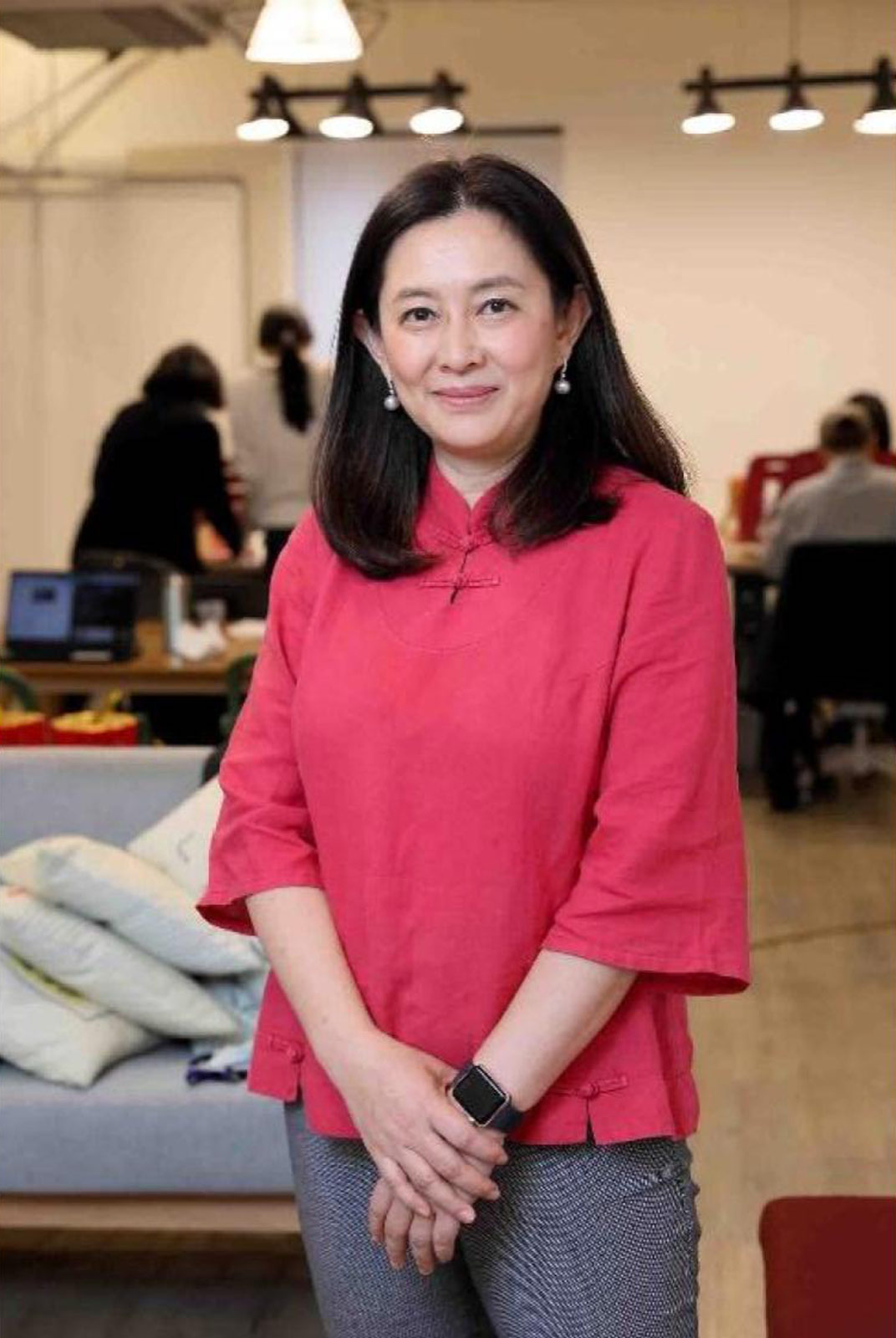TSMC and Fubon support the first international think tank headquartered in Taiwan

Source:Chien-Tong Wang
Syaru Shirley Lin, after retiring from Goldman Sachs, decided to return to Taiwan to establish the Center for Asia-Pacific Resilience and Innovation (CAPRI), the first international NGO headquartered in Taiwan. What was the reason behind her move?
Views
TSMC and Fubon support the first international think tank headquartered in Taiwan
By Rebecca Linweb only
This January, former U.S. Deputy National Security Advisor Matt Pottinger spoke in Taiwan. In March, Richard C. Bush, former chairman of the board of the American Institute in Taiwan and current nonresident senior fellow in the Center for East Asia Policy Studies at Brookings, will also visit Taiwan to participate in a public forum.
In May, former Australian Prime Minister Malcolm Turnbull will also arrive in Taiwan. Important figures from international politics and academia are visiting Taiwan one after another, all at the invitation of CAPRI.
The establishment of CAPRI was officially announced at WEF last year; CAPRI not only is the first international nongovernmental organization to be headquartered in Taiwan but also brings Taiwan to a high-profile international arena that had always excluded it.
CAPRI has also received the support of leading private-sector organizations in Taiwan, including the Cheng-Han Education Charity Trust Fund affiliated with Fubon Group, Acer Foundation, and MediaTek as founding donors, followed by new donors TSMC and UMC. With this support, CAPRI will launch a series of projects this year.
Building a think tank in the Asia-Pacific region
The key to CAPRI’s ability to gain widespread attention at home and abroad lies in its chair Syaru Shirley Lin. She studied in the United States after finishing middle school. After living there as well as in Japan, Hong Kong, and other places, she returned to Taiwan at the age of 53 with her husband Harry Harding, a well-known China expert from the United States who advised President Clinton and his administration.
Lin is of average height with medium-long straight hair. Everyone she meets is impressed by her energetic style. She has been known as the youngest female partner of Goldman Sachs, and after retirement, she obtained a PhD in Hong Kong. She is currently a research professor at the Miller Center of Public Affairs at the University of Virginia and a nonresident senior fellow in the Foreign Policy Program at Brookings Institution. She is also an adjunct professor at the Chinese University of Hong Kong.
The opportunity to establish CAPRI came during the COVID-19 pandemic. As the world looked to Taiwan because of its impressive performance in pandemic prevention, Lin and her husband were constantly receiving requests from international partners to invite Taiwanese public health experts to speak or participate in international conferences.
 Syaru Shirley Lin is the driving force behind CAPRI, hoping to bring Taiwan to the world through this international think tank. (Image credit: Chien-Tong Wang)
Syaru Shirley Lin is the driving force behind CAPRI, hoping to bring Taiwan to the world through this international think tank. (Image credit: Chien-Tong Wang)
Lin had been discussing the importance of setting up a think tank in Asia with her husband for years. In 2020, Taiwan was globally recognized for its achievements in safeguarding public health during the pandemic. It later received vaccines donated from the United States and Japan.
She began to think that if Taiwan prides itself as an advanced country, it must take the lead in explaining to the world its ideas and practices on major issues, such as pandemic response and climate change, and even help other countries in the Asia-Pacific region.
Lin’s opinion is shared by Malcolm Turnbull, a friend of hers for more than three decades and co-chair of the Reform for Resilience (R4R) Commission. Turnbull reflected that as prime minister of Australia, he often had to contact Washington or Beijing. “He thought that was wrong; Asia-Pacific countries should first connect with each other and take action, rather than sit and wait for Washington or Beijing to decide,” Lin recalled.
Setting up a think tank has no shortage of challenges
Lin swiftly started setting up a think tank, which became her most important project. However, it was far from easy to set up an international NGO in Taiwan; in fact, it was unprecedented. Besides the challenges of finding funds and talent, Lin was not even sure if the think tank should be regulated by the Ministry of Education, the Ministry of the Interior, or another government body. Existing regulations are too rigid in Taiwan, making the establishment of new foundations difficult.
This January, Harding retired from five decades of teaching in universities and moved to Taiwan to become a Yushan Scholar at National Chengchi University to support his wife. Over the past year, Harding has seen Lin navigate bureaucratic systems. “The first thing he would say when he woke up every day was to ask me, ‘do you want to keep going?,’” said Lin.
Lin confessed that there are problems to be solved every single day, and she and her colleagues have suffered from challenges one after another. “I am so committed because I am Taiwanese. We cannot make it without commitment, and everyone thinks that it is a miracle that CAPRI has been established.”
In 2020, Lin first sought help from Irene Chen, executive director of Fubon Cultural and Educational Foundation. “She acts without any hesitation, always stays positive and intelligent, and she’s incredibly efficient.” Chen and Daniel Tsai, Chairman of Fubon Group, met Lin through Goldman Sachs. After inviting Lin to several talks, they agreed to support her in setting up the Asia-Pacific Hub of the R4R Commission, which had been established to make the COVID-19 pandemic a catalyst for building a healthier and more resilient model of sustainable development internationally.
When he learned that Lin wanted to contribute more by building an international think tank in Taiwan, Daniel Tsai was very supportive. “He thinks that it's exactly people like Lin who enable us to take a big step forward in what we want to do,” Irene Chen said. The pandemic has made everyone realize that health challenges are global and cannot be separated by jurisdictions. Taiwan needs to have more connections with the world, and Lin’s international networks and research resources have naturally drawn others to her.
Although Taiwan cannot participate in many formal international organizations, this should not affect our ambitions.
In practice, many challenges remain. Fortunately, Lin receives guidance from various leaders in society. When Stan Shih, the founder of Acer Group, learned through Irene Chen of Lin’s ambitions, he took the initiative to join Lin and introduced her to TSMC, MediaTek, and other leading enterprises. Shih advised that Lin ask the National Development Council to be CAPRI’s regulator, and he accompanied her to meet President Tsai Ing-wen for support, along with now-Premier Chen Chien-jen and Minister Kung Ming-hsin of the National Development Council.
Bringing good governance in Taiwan to the world
“We hope that the government can develop an approach to enable international nongovernmental organizations to be established in Taiwan,” Shih said. In recent years, Shih has promoted the altruistic principles of Wangdao, a philosophy of leadership in organizations based on the three core concepts: value creation, balancing interests, and sustainable development. CAPRI’s mission to enhance global resilience and promote innovative governance by drawing on the experience of the Asia-Pacific region through comparative public policy research resonates with Shih’s values.
Shih not only agreed to join the board of CAPRI but has also actively provided advice to Lin. In addition to his extensive experience in board operations and organizational governance, Shih has a thorough understanding of Taiwan’s laws and regulations. “She has been abroad for many years and has never encountered these problems in Taiwan,” Shih joked. “It might be a bit frustrating for her, but actually a lot can be achieved as long as it is not against the spirit of the legislation.”
Finally, at the suggestion of Shih and Chen Chien-jen, the National Development Council revised its regulations, enabling CAPRI to be one of the few national foundations under its authority and the first international nongovernmental organization to be headquartered in Taiwan.
Having dealt with the private sector for years, Lin understands the needs of the industry well.
The expectations from the business sector are straightforward: Taiwan is well governed, but it can do better,” Lin explained. Taiwan needs to look into governance around the world and learn the practices of other countries. “The point is to ask which system can bring the greatest benefit to its people and balance different interests in different political systems, whether democratic or not.
Lin believes that the essence of democratic governance is its ability to remain innovative and resilient over time; when it fails, it can be improved quickly to prepare for the next challenge. “CAPRI’s ambition is to help Taiwan improve and build consensus among different voices.”
This year, CAPRI will focus on comparative research on mental health and vaccine-related policy. Chang-Chuan Chan, distinguished professor in the College of Public Health at National Taiwan University who has known Lin for over 30 years, shared his views on CAPRI’s work. “We hope to present insights and experiences of good governance from the Asia Pacific and share them with the world.”
Can Taiwan also shape its own perspectives and help the world understand Taiwan better? This will be the challenge that Taiwan, which is eager to return to international society, needs to face next.
Have you read?
- Venture capitalist Tim Draper: China’s not a free market anymore
- How GagaOOLala became the world's biggest LGBTQ streaming platform
- Meet the young Taiwanese revolutionizing plant-based meat
Uploaded by Ian Huang






